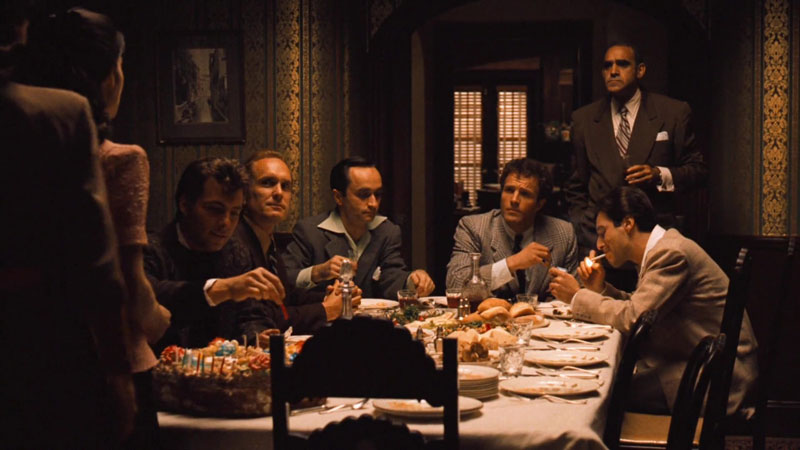GODFATHER, THE
(director/writer: Francis Ford Coppola; screenwriters: Francis Ford Coppola/Mario Puzo/based on the novel by Mario Puzo; cinematographer: Gordon Willis; editors: William H. Reynolds/Peter Zinner; music: Nino Rota; cast: Marlon Brando (Don Vito Corleone), Al Pacino (Michael Corleone), James Caan (Sonny Corleone), Robert Duvall (Tom Hagen), Diane Keaton (Kay Adams), Talia Shire (Connie), Al Lettieri (Sollozzo), Sterling Hayden (McCluskey), John Cazale (Fredo Corleone), Andy Garcia (Vincent Mancini), Eli Wallach (Don Altobello), Joe Mantegna (Joey Zaza), George Hamilton (B.J. Harrison), Bridget Fonda (Grace Hamilton), Sofia Coppola (Mary Corleone), Raf Vallone (Cardinal Lamberto), Abe Vigoda (Sal Tessio), Richard Castellano (Clemenza), Lee Strasberg (Hyman Roth), Al Martino (Johnny Fontane); Runtime: 175; MPAA Rating: R; producer: Albert S. Ruddy; Paramount Pictures; 1972)
“The epic gangster film.”
Reviewed by Dennis Schwartz
The epic gangster film is family hardened and breathes fire into the belly of the contemporary gangster genre. It represents the best of what Hollywood can produce. A Mafia tale where it’s difficult to tell if art imitates fiction or if the reverse is true. Marlon Brando makes his grand movie comeback by stuffing either cotton or orange peel in his mouth so he can mumble, shows his love for cats, and becomes the godfather of all film-dom’s godfathers by dispensing favors with lifetime debts (a godfather or “don,” is the head of a Mafia family). There are offers made that can’t be refused, a severed horse’s head ends up in the bed, numerous heartwarming ethnic family occasions are laced with chilling undertones of mixing pleasure with business, stylish crosscutting shots between religious ritual and gore-filled machine-gun executions serve as some kind of poor man’s poetry, and a lesson in dining manners takes place in a trattoria (translating to a marked diner taken out gangland style with firepower and falling over the linguini).
This lengthy but action-packed 1972 soap opera crime drama is one of the most popular American films ever made. It’s superbly acted, the script is sharp and witty, the 31-year-old director Francis Ford Coppola was never more on top of his game–creating a convincing and highly structured work that was both entertaining and worthy of much praise for bringing Mario Puzo’s best-selling novel to the screen in such a splashy style. Coppola also co-wrote The Godfather with Puzo.
The film covers the Mafia wars between 1945-1955. Michael Corleone (Al Pacino) is the godfather’s youngest son, an Ivy League graduate and independent thinker, who rebelled against his father by enlisting in the Army to fight in World War II and has returned a war hero. Michael, rejecting the family business, shows up at the wedding of his sister Connie (Talia Shire) with his outsider non-Italian girlfriend, Kay (Diane Keaton), who doesn’t know that he comes from a Mafia family until this occasion.
A short time later during the Christmas holiday season, the old-fashioned don refuses to go into the lucrative drug trade with an ambitious rising Mafia figure named Sollozzo (Al Lettieri) and is almost assassinated when rival gangs back Sollozzo. After saving his father from a second assassination attempt, Michael decides to get involved in the family business and after much persuasion gets his volatile eldest brother Sonny (James Caan), bumbling middle brother Fredo (John Cazale), even-tempered family adviser, the consigliari, Tom Hagen (Robert Duvall) and top gun Sal Tessio (Abe Vigoda) to approve of him being the one to exact revenge on his father’s enemies. Even though Hagen is Irish, Vito adopted him as a son and he’s become the brains behind the Corleones.
After murdering a corrupt police captain (Sterling Hayden) and the drug-trafficker responsible for trying to kill his father, Michael hides out in Sicily while a Mafia turf war erupts at home. In Sicily, Michael marries a local girl but she is later slain by Corleone foes when they fail to get him. Sonny is also slain in an ambush, having been betrayed by Connie’s husband. With so much bad news, Michael returns home and marries Kay. His father recovers and shrewdly makes peace with his rivals, realizing that another powerful don was pulling the strings behind the scenes. Michael learns the ropes of being a don and when his chance comes he leads the family to greater heights of prosperity than ever by doing business in an efficient modern way. But by this time, Michael has become an amoral full-grown bad guy and initiates a campaign of murderous revenge against those who once tried to wipe out his family. He succeeds in consolidating his family’s power and that seemingly happy ending leaves room for some more sequels.
It collected ten Academy Award nominations and won Best Picture, Best Actor (Brando) and Best Screenplay. It would remain the highest-grossing film until “Jaws” three years later.

REVIEWED ON 5/13/2004 GRADE: B+